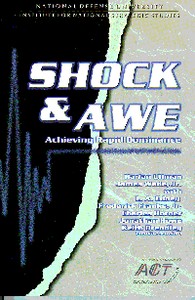Shock and Awe — Achieving Rapid Dominance by Harlan Ullman and James P. Wade
"Shock and Awe — Achieving Rapid Dominance" by Harlan Ullman and James P. Wade is a strategic military treatise published during the late 20th century. The work examines how the United States can maintain its military superiority and adapt its strategic doctrine in a post-Cold War environment where conventional threats have diminished. The central focus of the book is on the concept of "Rapid Dominance," which aims to shape adversaries' perceptions and
will through a regime of "Shock and Awe," effectively rethinking how power is employed in modern warfare and possibly redefining military doctrine. The opening of this work sets the stage for a critical examination of contemporary military strategy in light of shifting geopolitical dynamics and technological advancements. It begins with a foreword discussing the changing nature of global conflict and the necessity for U.S. military forces to adapt to an uncertain future. In the prologue, the authors articulate their intent to explore new mission capabilities and the principles that underpin the concept of Rapid Dominance. They highlight the importance of understanding not only the physical capabilities of the military but also how to affect an adversary’s will and perception to achieve strategic goals without necessarily resorting to brute force. The initial chapters establish the foundational ideas behind Rapid Dominance, emphasizing the significance of integrating technology, strategy, and innovation to induce psychological shock and incapacitate opposing forces. (This is an automatically generated summary.)
Read or download for free
| How to read | Url | Size | |||
|---|---|---|---|---|---|
| Read now! | https://www.gutenberg.org/ebooks/7259.html.images | 294 kB | |||
| EPUB3 (E-readers incl. Send-to-Kindle) | https://www.gutenberg.org/ebooks/7259.epub3.images | 127 kB | |||
| EPUB (older E-readers) | https://www.gutenberg.org/ebooks/7259.epub.images | 131 kB | |||
| Kindle | https://www.gutenberg.org/ebooks/7259.kf8.images | 241 kB | |||
| older Kindles | https://www.gutenberg.org/ebooks/7259.kindle.images | 222 kB | |||
| Plain Text UTF-8 | https://www.gutenberg.org/ebooks/7259.txt.utf-8 | 281 kB | |||
| Download HTML (zip) | https://www.gutenberg.org/cache/epub/7259/pg7259-h.zip | 121 kB | |||
| There may be more files related to this item. | |||||
Similar Books
About this eBook
| Author | Ullman, Harlan, 1941- |
|---|---|
| Author | Wade, James P., 1930- |
| Title | Shock and Awe — Achieving Rapid Dominance |
| Note | Reading ease score: 40.1 (College-level). Difficult to read. |
| Credits | Produced by an anonymous Project Gutenberg volunteer. |
| Language | English |
| LoC Class | U: Military science |
| Subject | Rapid dominance (Military science) |
| Category | Text |
| EBook-No. | 7259 |
| Release Date | Jan 1, 2005 |
| Most Recently Updated | Sep 22, 2014 |
| Copyright Status | Public domain in the USA. |
| Downloads | 182 downloads in the last 30 days. |
| Project Gutenberg eBooks are always free! | |


